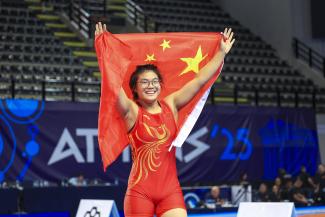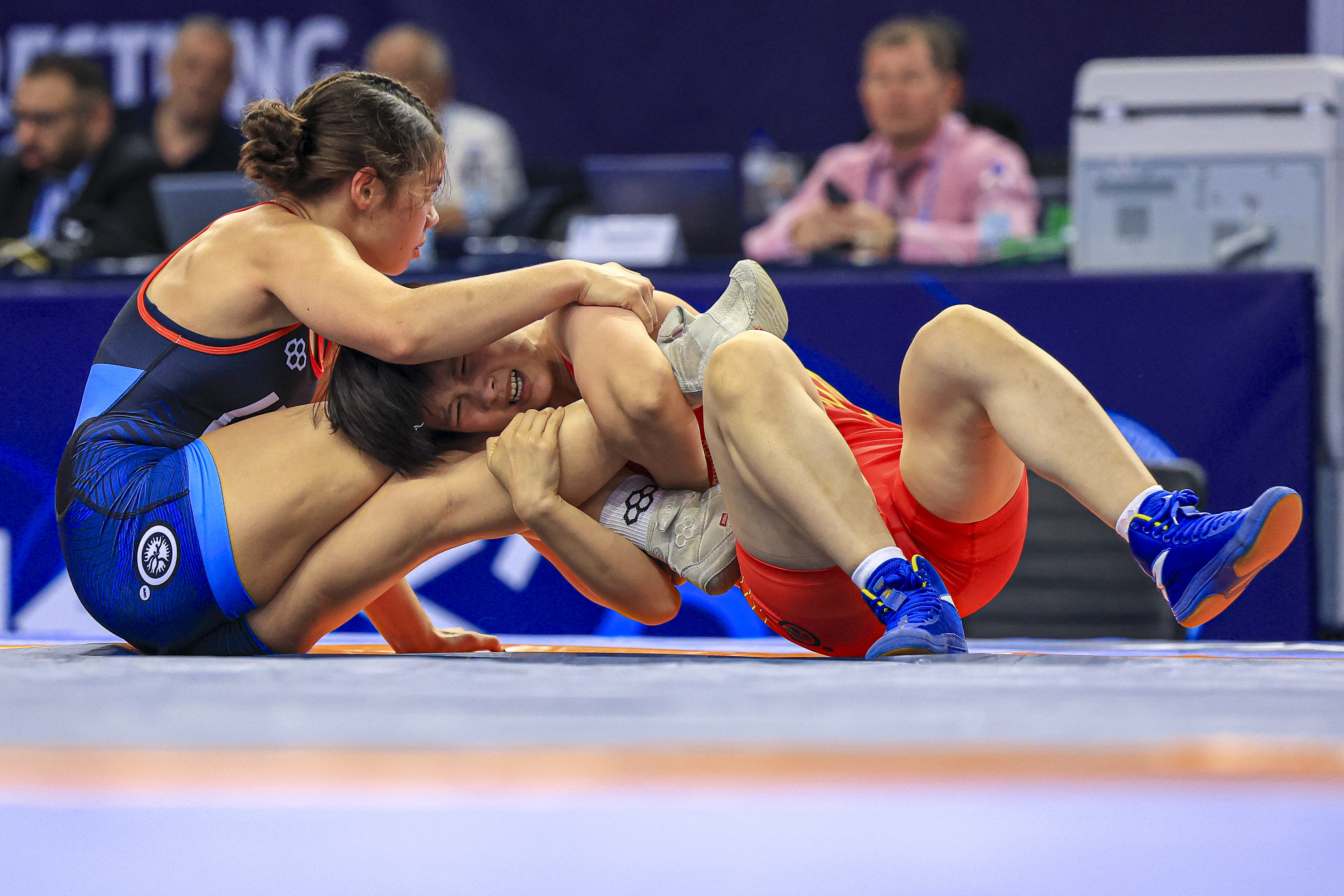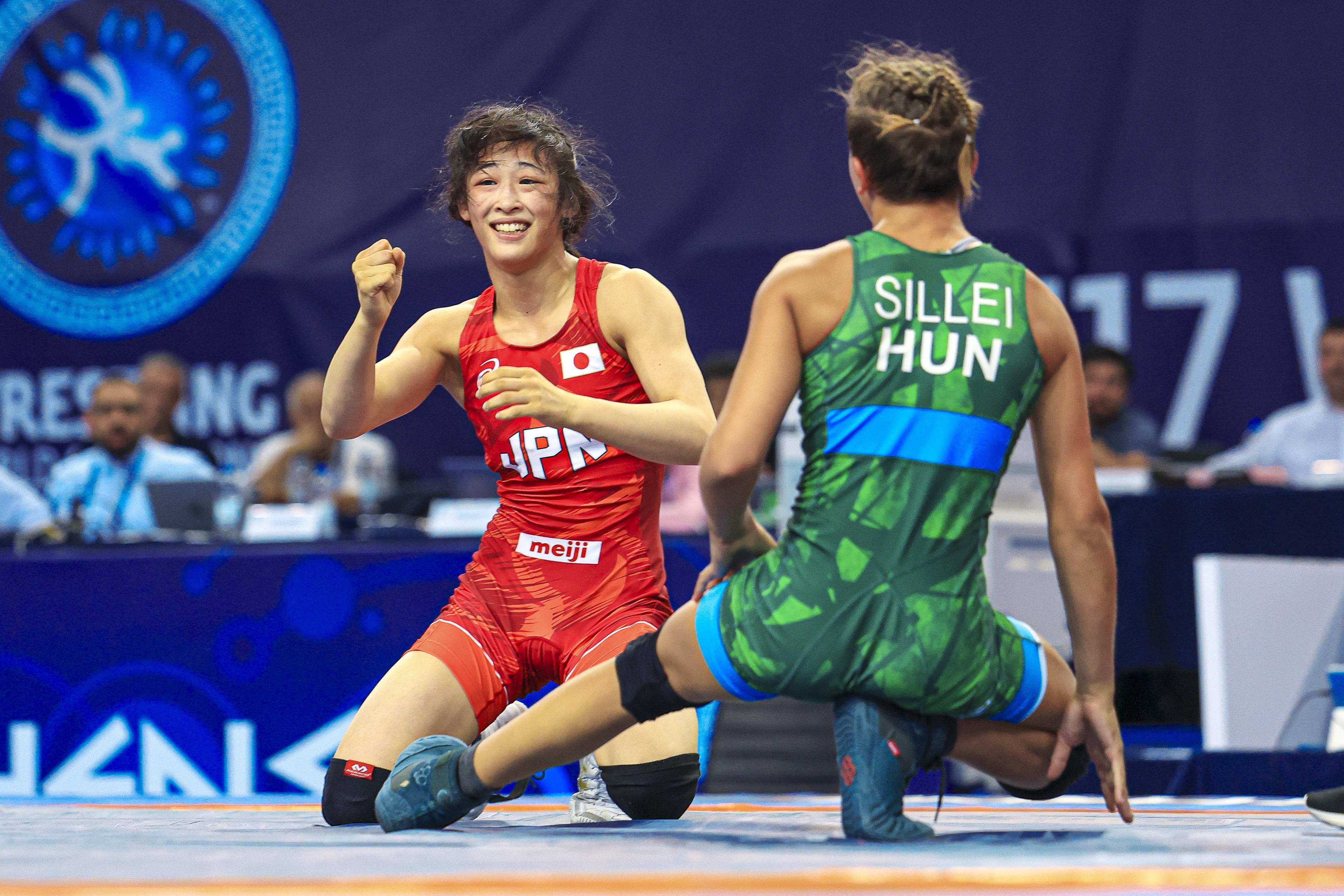Zholdoshbekov Claims First Men’s Freestyle World Title for Kyrgyzstan Since 2005
Wednesday, October 30, 2019 - 22:34 By Taylor Miller

Photo of Ulukbek ZHOLDOSHBEKOV (KGZ) by Kadir Caliskan.
BUDAPEST, Hungary – On Wednesday night at the 2019 U23 World Championships, Ulukbek ZHOLDOSHBEKOV (KGZ) did what no other men’s freestyle wrestler from his country has done since 2005—win a World title.
The last men’s freestyle wrestler from Kyrgyzstan in any age-group to win a World gold medal was Iliaz Ozumbekov at the 2005 Junior World Championships in Vilnius, Lithuania.
Competing at 61 kg, Zholdoshbekov faced 2016 Cadet World bronze medalist Ravinder RAVINDER (IND) in the gold-medal match.
Trailing at the break, Zholdoshbekov scored a takedown then added exposure halfway through the second period, which propelled him to an eventual 5-3 win.
After competing in seven World Championships, Zholdoshbekov finally claimed his first UWW World Championships medal. Last year, he came up just short in the U23 World bronze-medal match.
At 86 kg, Kamran GHASEMPOUR (IRI) won his second-consecutive U23 World championship with a decisive 9-3 win over Gadzhimurad MAGOMEDSAIDOV (AZE).
After a slow start in the first period, Ghasempour piled on the takedowns for the victory. The win adds to his 2018 U23 World gold and 2013 Cadet World silver.
Battling an injury the entire tournament, Razambek ZHAMALOV (RUS) came out on top in the 74 kg bracket.
Zhamalov, a 2018 Junior World silver medalist, faced off against 2017 Cadet World bronze medalist Mohammed NOKHODILARIMI (IRI) in the title bout.
The Russian used two four-point periods to zoom past the Iranian for an 8-1 win and the gold medal.
At 92 kg, Bo NICKAL (USA) was the first of the night to win his gold-medal match by technical fall.
Wrestling Batyrbek TSAKULOV (RUS), Nickal scored multiple times for a dominant 12-2 victory, which included a four-point takedown.
2018 Cadet World champion and 2019 Junior World silver medalist Amir Hossein ZARE (IRI) followed Nickal’s lead, shutting down 2016 U23 European bronze medalist Vitali GOLOEV (RUS) in the finals match at 125 kg, 10-0.
Zare won all four of his matches by technical fall for the 125 kg crown.
Russia won the team title with 145 points, followed by Iran with 139 points and Azerbaijan with 111 points. Throughout the 2019 season, Russia has won the men’s freestyle team title in every age-group, including Cadet, Junior, U23 and Senior.
Finals results
61 kg
GOLD - Ulukbek ZHOLDOSHBEKOV (KGZ) df. Ravinder RAVINDER (IND), 5-3
BRONZE - Dinislam TAKHTAROV (RUS) df. Arsen HARUTYUNYAN (ARM), fall
BRONZE - Ryutaro HAYAMA (JPN) df. Daulet TAZHIBAY (KAZ), 1-0
74 kg
GOLD - Razambek ZHAMALOV (RUS) df. Mohammed NOKHODILARIMI (IRI), 8-1
BRONZE - Byambadorj BAT ERDENE (MGL) df. Murad KURAMAGOMEDOV (HUN), 5-3
BRONZE - Giorgi SULAVA (GEO) df. Fazli ERYILMAZ (TUR), fall
86 kg
GOLD - Kamran GHASEMPOUR (IRI) df. Gadzhimurad MAGOMEDSAIDOV (AZE), 9-3
BRONZE - Hayato ISHIGURO (JPN) df. Ivan NEDEALCO (MDA), 11-0
BRONZE - Osman GOCEN (TUR) df. Gankhuyag GANBAATAR (MGL), 3-0
92 kg
GOLD - Bo NICKAL (USA) df. Batyrbek TSAKULOV (RUS), 12-2
BRONZE - Yonger Pauli BASTIDA POMARES (CUB) df. Demur MEGENEISHVILI (GEO), 6-2
BRONZE - Hossein Lotfali SHAHBAZIGAZVAR (IRI) df. Shamil ZUBAIROV (AZE), 5-1
125 kg
GOLD - Amir Hossein ZARE (IRI) df. Vitali GOLOEV (RUS), 10-0
BRONZE - Yusup BATIRMURZAEV (KAZ) df. Zuriko URTASHVILI (GEO), 13-2
BRONZE - Lkhagvagerel MUNKHTUR (MGL) df. Daniel Gregory KERKVLIET (USA), 4-4
Team standings
1. Russia – 145
2. Iran – 139
3. Azerbaijan – 111
4. Georgia – 109
5. Mongolia – 70
6. Japan – 65
7. Kazakhstan – 65
8. Turkey – 60
9. Ukraine – 58
10. USA – 57


 Jiaqing JIANG (CHN) defeated Epenesa ELISON (USA) in the 53kg final. (Photo: United World Wrestling / Amirreza Aliasgari)
Jiaqing JIANG (CHN) defeated Epenesa ELISON (USA) in the 53kg final. (Photo: United World Wrestling / Amirreza Aliasgari) Hanano OYA (JPN) won the 46kg gold medal in Athens. (Photo: United World Wrestling / Amirreza Aliasgari)
Hanano OYA (JPN) won the 46kg gold medal in Athens. (Photo: United World Wrestling / Amirreza Aliasgari)
Share your thoughts.
Comments